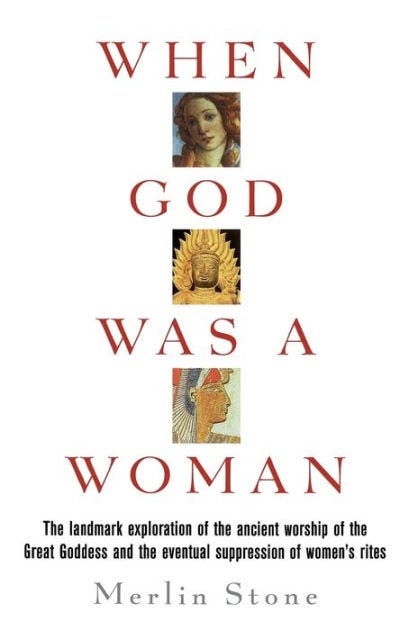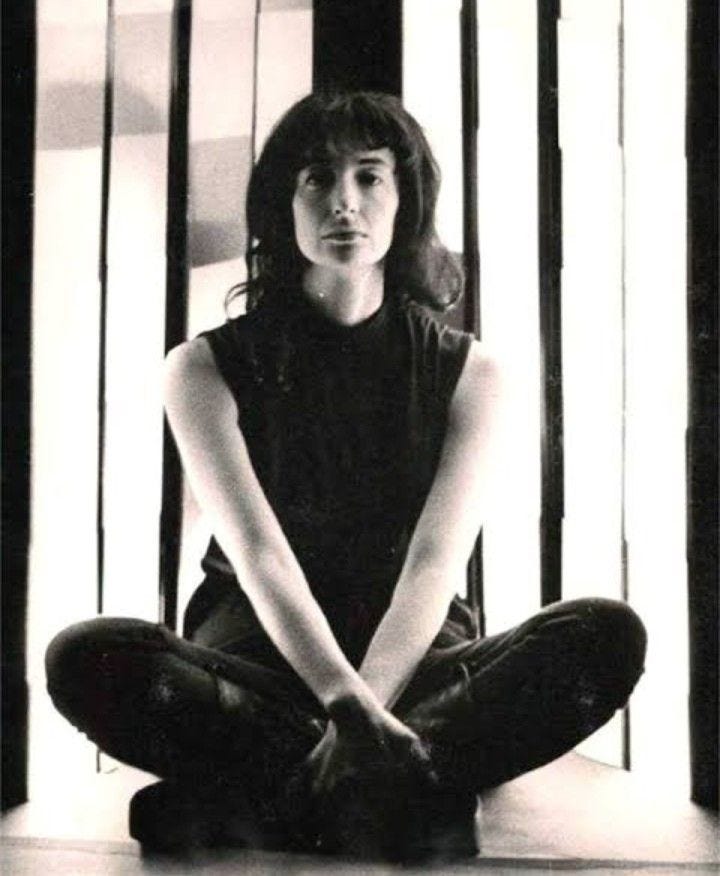Welcome to SparkSiren, where stories inspire impact ✨
With this being the very first issue of the SparkSiren newsletter, I wanted to jumpstart this reader experience with a title that was not only provocative but was written to completely restructure the degree of importance with which we regard women in our world.
Merlin Stone’s book title, “When God Was A Woman” discusses how the Great Goddess was the master of our universe for most of our ancient civilisations, but also how that high regard was slowly diminished when the concept of a sole male deity came to the foreground. Her writing ultimately discusses how the suppression of the Goddess also resulted in the suppression of the women in our society.
In this book, Stone disassembles the current constructs of religious structure by exploring the history of the Goddess and our society’s relation to that belief. She also explores how our perception and integration of religion ultimately impact the state of our cultures as well as the perception we uphold each gender.
In this email we’ll cover:
The Book of The Week
Quotes and Questions to Reflect On
Further Insights
“Myths represent ideas that guide perception, conditioning us to think and even perceive in a particular way, especially when we are young and impressionable.” - Merlin Stone, “When God Was a Woman”

What's New This Week
Book of the Week: Non-Fiction
“When God Was a Woman” by Merlin Stone
Synopsis:
This book explores the history of religion as well as that our earliset form of religious practice which, during the most ‘ancient periods of human existence,’ can be traced back to worshipping the Great Goddess.
Stone goes on to backing her theory with ancient scriptures, sculptures, and the historical understanding that people of that time had access to, to demonstrate that women used to be perceived in high regard. Overtime that evolved into worshipping our female ancestors, which then evolved into the worship of female deities. Evidently, worshipping the Great Goddess seems to be the consistent pattern of that period.
Stone goes into the reasoning for these preferences in historic detail. Before the awareness of male contribution to pregnancy, women were deemed as the sole parent as ancient people did not yet have the understanding that sex led to conception. So women were considered to be the only gender that could conceive the next generation, and therefore, were to be the key decision-maker in regards to the next generation.
As such, these early civilisations held females in incredible regard which, overtime, formed matriarichal societies. Furthermore, as a byproduct, the belief that God is female took precedence as it was believed that women were not only the gateway to heaven, but also the bringers of life. These historic beliefs span as far back as 7000 B.C. - some argue as far as 25000 B.C. - it’s a worthwhile read to understand the thought process of our ancestral lineage, as well as the beliefs that encompassed those cultures.
Why I Love It:
What I love about Stone’s work is how informed she is on the subject. Although I would say that this is less about arguing whose image God is made in, and more of a comment on the anthropology of our media and religious texts.
The subtle influences of our religions seep deeply into the perception of our environment and each other, whether we practice religion or not. So a book such as this holds so much value to our greater understanding, in my opinion. The book is ultimately a comment on our knowledge of the foundations that have determined our cultural perception. As the book argues, if our understanding of history is skewed, could our perceptions be misaligned as well?
With history in mind, as well as discussing how our current beliefs came about, deeper knowing can lead to a shift in our understanding of the world and of women’s place in it. Perhaps this book can help us shift into owning and experiencing the power that we truly hold as women.
Quotes and Questions to Reflect On
Quote of the Week:
When the ancient sources of the gender stereotyping of today are better understood, the myth of the Garden of Eden will no longer be able to haunt us. - Merlin Stone
Reflection Questions:
What were your first thoughts when reading the title?
Were there moments in the book that evoked a sense of reflection on our current culture?
Did you feel that Merlin Stone’s depiction of our religious history would hold value in Western culture today?
Is there any part of the book that you found empowering or thought-provoking?
Introduction to a few Greek Goddesses:
If content like this intrigues you, as it does me, perhaps it’s worthwhile to dive deeper into some of the information available on our more well-known Goddesses.
Insights and Inspiration
Author Spotlight:
“When God Was A Woman” is one of Merlin Stone’s most notable pieces of work. She was further known as a professor of art, a professor of art history, an artist, as well as an author. Although her online presence and information on her background remain fairly discreet, she does have a biography written about her called, “Merlin Stone Remembered: Her Life and Works” written by David B. Axelrod, Carol F. Thomas, and Lenny Schneir, which depicts in more detail how she lived her life.
If you’re interested in more of her work;
Other Works Include:
Ancient Mirrors of Womanhood: A Treasury of Goddess and Heroine Lore From Around The World
Ancient Mirrors of Womanhood: Vol 2
Beyond the Book:
There are currently several books that explore feminism about religion, as well as our intuitive connection to the universe.
These books include:
Goddesses in Every Woman by Jean Bolen
The Red Tent by Anita Diamant
Closing Remarks
One of the reasons this read was so compelling for me was that it highlights the importance of our historic (as well as current) perception of women. So much of our world can change simply by enhancing our knowledge and our perception of the world.
This book makes it clear that regardless of our current religious beliefs, the conditioning of the perception of gender still prevails within our culture. What can we do to embark on a journey that values both women and men in our society?
Until Next Time!
Thank you so much for making it this far along! If you would like to receive weekly newsletters from SparkSiren instead of monthly, then please subscribe below.
Otherwise, thank you for being a part of the Spark Siren community, where we inspire impact through the power of story.
Warm regards,
June Tara
Founder of Spark Siren





